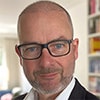Aug 11, 2020
Philips makes access to care and personalized telehealth for local communities real with Virtual Care Station
Telehealth environment originally developed for veterans gives patients access to clinicians in convenient, close-to-home locations through retail & public settings
Amsterdam, the Netherlands and Cambridge, Mass., U.S. – Royal Philips (NYSE: PHG, AEX: PHIA), a global leader in health technology, today announced the launch of Virtual Care Station [1], a telehealth environment that delivers virtual care services in convenient neighborhood locations such as retail settings, libraries, town halls and universities. The pod-based solution connects provider and insurance networks, allowing health providers and patients to have a local, community-based choice for care. Whether in underserved rural or urban areas, Virtual Care Station helps deliver on the Quadruple Aim by giving patients access to virtual face-to-face care, and is designed to help improve clinical outcomes, lower costs and increase patient and staff satisfaction. Virtual Care Station is based on Philips technology developed for the ATLAS program (Accessing Telehealth through Local Area Stations), which was created to serve the healthcare needs of U.S. veterans. Before the COVID-19 pandemic, trends showed some increased interest in the use of telehealth services by both healthcare providers and patients [2,3,4]. However, recent policy changes during the pandemic have reduced barriers to telehealth access and have promoted the use of telehealth as a way to deliver acute, chronic, primary and specialty care [5]. Although at-home telehealth solutions are a convenient option, many patients do not have access to reliable internet access or the digital devices required for telehealth. Moreover, patients may not have the privacy they need for sensitive clinical conversations at home, making the Virtual Care Station a timely option. Philips created the Virtual Care Station with insights from patients, physicians and caregivers to offer patients the convenience and care of a traditional face-to-face visit. The telehealth station features a camera, lighting and speakers, all specifically designed to provide the clinician and patient the control to produce a high-quality view of the patient and their specific area of concern. Further, the Virtual Care Station features thoughtful design, including enough room to accommodate the needs of a patient in a wheelchair or with a service dog. Virtual Care Station’s uses can be extended in the future with different capabilities, such as tele-dentistry, and new technologies that further limit touch points such as contactless monitoring. It also offers the potential to supplement visits with remote patient monitoring devices in the home, allowing care teams to track patients’ health between visits.
By expanding our telehealth solution, we hope to give providers an option to engage in population health and support patients closer to home in lower cost settings that can lead to the potential for more follow-up visits, and the opportunity for clinicians to identify at-risk patients earlier and manage health escalations.
Vitor Rocha
Chief Market Leader for Philips North America
Today, telehealth options have the potential to help take pressure off of healthcare systems that are overtaxed by COVID-19. According to the CDC, changes in the way that health care is delivered during this pandemic are needed to reduce staff exposure to ill persons, preserve personal protective equipment (PPE) and minimize the impact of patient surges on facilities. Healthcare systems have had to adjust the way they triage, evaluate and care for patients using methods that do not rely on in-person services [6]. Telehealth services help provide necessary care to patients while minimizing the transmission risk of COVID-19 to healthcare personnel and patients. “By expanding our telehealth solution, we hope to give providers an option to engage in population health and support patients closer to home in lower cost settings that can lead to the potential for more follow-up visits, and the opportunity for clinicians to identify at-risk patients earlier and manage health escalations,” said Vitor Rocha, Chief Market Leader for Philips North America. “Not only does it mean the convenience of shorter drive times for patients, it could mean better health outcomes and a safer environment for providers as people benefit from getting the quality care they need in the right place at the right time.” For more information on Philips Virtual Care Station, please visit Virtual Care Station. [1] Currently available in North America only. [2] American Medical Association, 2020. AMA Digital Health Research: Physician’s motivation and requirements for adopting digital health—adoption and attitudinal shifts from 2016 to 2019. https://www.ama-assn.org/system/files/2020-02/ama-digital-health-study.pdf [3] Martinez KA, Rood M, Jhangiani N, Kou L, Rose S, Boissy A, Rothberg MB. Patterns of use and correlates of patient satisfaction with a large nationwide direct to consumer telemedicine service. Journal of General Internal Medicine. 2018 Oct 1;33(10):1768-73. [4]Orlando JF, Beard M, Kumar S. Systematic review of patient and caregivers’ satisfaction with telehealth videoconferencing as a mode of service delivery in managing patients’ health. PloS One. 2019;14(8). [5] Bashshur R, Doarn CR, Frenk JM, Kvedar JC, Woolliscroft JO. Telemedicine and the COVID-19 Pandemic, Lessons for the Future. Telemedicine and e-Health. May 2020.571-3. http://doi.org/10.1089/tmj.2020.29040.rb [6] https://www.cdc.gov/coronavirus/2019-ncov/hcp/telehealth.html
About Royal Philips
Royal Philips (NYSE: PHG, AEX: PHIA) is a leading health technology company focused on improving people's health and enabling better outcomes across the health continuum from healthy living and prevention, to diagnosis, treatment and home care. Philips leverages advanced technology and deep clinical and consumer insights to deliver integrated solutions. Headquartered in the Netherlands, the company is a leader in diagnostic imaging, image-guided therapy, patient monitoring and health informatics, as well as in consumer health and home care. Philips generated 2019 sales of EUR 19.5 billion and employs approximately 81,000 employees with sales and services in more than 100 countries. News about Philips can be found at www.philips.com/newscenter.
Topics
Contacts

Joost Maltha
Philips Global Press Office Tel: +31 6 10 55 8116
You are about to visit a Philips global content page
Continue
Silvie Casanova
Philips North America Tel: +1 781 879 0692
You are about to visit a Philips global content page
ContinueMedia assets
Press releases
Get our press releases by e-mail
You are about to visit a Philips global content page
Continue









